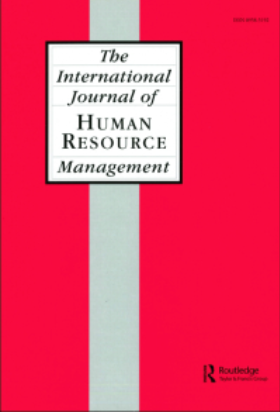Antecedents and consequences of perpetrator-centric knowledge hiding within organizations: a cross-cultural meta-analytic review and implications for human resource management
IF 5.9
2区 管理学
Q1 MANAGEMENT
International Journal of Human Resource Management
Pub Date : 2023-11-09
DOI:10.1080/09585192.2023.2278525
引用次数: 0
Abstract
AbstractAs knowledge hiding has become an increasingly widespread phenomenon within organizations, there has been a dramatic increase in research on this topic over the past two decades. However, previous studies have provided inconsistent conclusions on why knowledge hiding occurs and how it affects the perpetrator’s subsequent work and well-being outcomes. As no reviews to date have focused on the knowledge hiding from the perpetrator’s perspective, this meta-analysis systematically synthesizes frequently studied antecedents and consequences of perpetrator-centric knowledge hiding. It also examines the moderating effects of cultural dimensions and causal directions on the consequences. Based on evidence from N = 193 sources with a total sample size of N = 68,113, this meta-analysis found significantly strong relationships between neuroticism, moral disengagement (hider’s factors), psychological contract breach, toxic leadership, leader-signaled knowledge hiding, perceived organizational politics (contextual factors) and knowledge hiding. The findings revealed that knowledge hiding had a medium-sized positive relationship with perpetrator psychological strain. It also uncovered the cross-cultural differences among the perpetrator-centric consequences. These findings helped answer the question of whether some common predictors or outcomes of knowledge hiding should be identified as outcomes or indicators. Finally, it provided suggestions for future research and human resource management (HRM) practices.Keywords: Knowledge hidingperpetrator-centriccross-culturalmeta-analysisHRM Disclosure statementNo potential conflict of interest was reported by the author(s).Data availability statementThe data that support the findings of this study are available on reasonable request from the corresponding author, Mengtian Xiao.Additional informationFundingThis work was supported by the National Natural Science Foundation of China (research project 72102191).组织中以行为人为中心的知识隐藏的前因后果:跨文化元分析综述及其对人力资源管理的启示
摘要随着知识隐藏在组织中越来越普遍,在过去的二十年中,对这一主题的研究急剧增加。然而,之前的研究在知识隐藏发生的原因以及它如何影响犯罪者随后的工作和幸福结果方面提供了不一致的结论。由于目前还没有从行为人的角度对知识隐藏进行研究,本研究系统地综合了以行为人为中心的知识隐藏的前因和后果。它还考察了文化维度和因果方向对后果的调节作用。基于N = 193个来源的证据,总样本容量N = 68,113,本meta分析发现,神经质、道德脱离(隐藏者因素)、心理契约违约、有毒领导、领导者信号型知识隐藏、感知组织政治(语境因素)和知识隐藏之间存在显著的强相关性。结果表明,知识隐藏与犯罪人心理压力呈中等正相关。它还揭示了以肇事者为中心的后果之间的跨文化差异。这些发现有助于回答是否应该将知识隐藏的一些共同预测因素或结果确定为结果或指标的问题。最后,对未来的研究和人力资源管理实践提出了建议。关键词:知识隐藏加害者中心跨文化元分析披露声明作者未报告潜在利益冲突。数据可得性声明支持本研究结果的数据可应通讯作者肖梦天的合理要求获得。项目资助:国家自然科学基金项目(72102191)。
本文章由计算机程序翻译,如有差异,请以英文原文为准。
求助全文
约1分钟内获得全文
求助全文
来源期刊
CiteScore
11.70
自引率
7.10%
发文量
77
期刊介绍:
International Journal of Human Resource Management is the forum for HRM scholars and professionals worldwide. Concerned with the expanding role of strategic human resource management in a fast-changing global environment, the journal focuses on future trends in human resource management, drawing on empirical research in the areas of strategic management, international business, organizational behaviour, personnel management and industrial relations that arise from: -internationalization- technological change- market integration- new concepts of line management- increased competition- changing corporate climates Now publishing twenty-two issues per year, The International Journal of Human Resource Management encourages strategically focused articles on a wide range of issues including employee participation, human resource flow, reward systems and high commitment work systems. It is an essential publication in an exciting field, examining all management decisions that affect the relationship between an organization and its employees. Features include; -comparative contributions from both developed and developing countries- special issues based on conferences and current issues- international bibliographies- international data sets- reviews

 求助内容:
求助内容: 应助结果提醒方式:
应助结果提醒方式:


